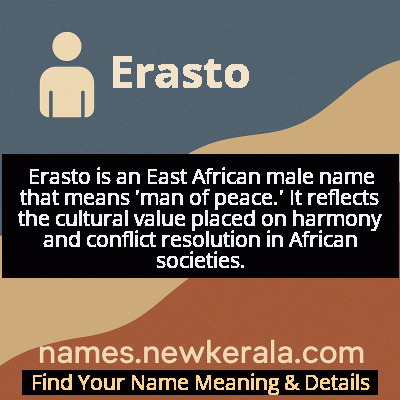Erasto Name Meaning & Details
Origin, Popularity, Numerology Analysis & Name Meaning of Erasto
Discover the origin, meaning, and cultural significance of the name ERASTO. Delve into its historical roots and explore the lasting impact it has had on communities and traditions.
Name
Erasto
Gender
Male
Origin
African
Lucky Number
6
Meaning of the Name - Erasto
Erasto is an East African male name that means 'man of peace.' It reflects the cultural value placed on harmony and conflict resolution in African societies.
Erasto - Complete Numerology Analysis
Your Numerology Number
Based on Pythagorean Numerology System
Ruling Planet
Venus
Positive Nature
Harmonious, responsible, caring, and artistic.
Negative Traits
Overly idealistic, superficial, possessive, or jealous.
Lucky Colours
Pink, turquoise.
Lucky Days
Friday.
Lucky Stones
Diamond, turquoise.
Harmony Numbers
2, 3, 9.
Best Suited Professions
Artists, musicians, teachers, healthcare workers.
What People Like About You
Warmth, nurturing nature, artistic flair.
Famous People Named Erasto
Erasto Ntahondi
Tanzanian politician
Member of Parliament and former Deputy Minister in Tanzania
Erasto Nyoni
Tanzanian footballer
Professional footballer who played for Simba SC and the Tanzanian national team
Erasto Andrew
Tanzanian educator
Renowned teacher and educational administrator in East Africa
Erasto Mwenye
Zambian diplomat
Former Zambian ambassador and government official
Name Variations & International Equivalents
Click on blue names to explore their detailed meanings. Gray names with will be available soon.
Cultural & Historical Significance
The name's popularity in East Africa can be traced to both indigenous traditions and the influence of Christianity, where the similar name Erastus appears in the New Testament as a companion of Paul. This dual heritage makes Erasto a bridge between traditional African values and broader religious influences, representing the synthesis of local cultural identity with global religious traditions that characterizes much of modern East African society.
Historically, names meaning 'peace' or 'man of peace' held special importance in African communities where conflict resolution and community harmony were essential for survival and prosperity. Erasto continues this tradition, serving as a constant reminder of the cultural priority placed on peaceful coexistence and the role individuals play in maintaining social balance.
Extended Personality Analysis
Individuals named Erasto are typically perceived as calm, diplomatic, and peace-loving personalities. They often exhibit natural leadership qualities tempered with a strong sense of empathy and understanding toward others. Their peaceful nature doesn't indicate weakness but rather a strategic approach to conflict resolution and relationship building. Erastos tend to be excellent mediators who can navigate complex social situations with grace and tact.
These individuals often possess strong communication skills and emotional intelligence, allowing them to understand multiple perspectives and find common ground in disagreements. They are typically reliable, trustworthy, and maintain stable relationships both personally and professionally. While they value harmony, they also demonstrate quiet strength and conviction when principles are at stake, making them respected figures in their communities who can advocate for change without creating unnecessary conflict.
The name's meaning often creates a self-fulfilling prophecy where individuals feel compelled to live up to their peaceful designation. This can manifest as careful decision-making, thoughtful responses to challenges, and a natural inclination toward professions that involve counseling, teaching, or community leadership. Their peaceful demeanor often makes them sought-after friends and advisors, though they may sometimes struggle with setting boundaries due to their desire to maintain harmony at all costs.
Modern Usage & Popularity
In contemporary times, Erasto remains a popular name throughout East Africa, particularly in Tanzania and Kenya, where it continues to be chosen by parents who value its peaceful connotations and cultural heritage. While not among the most common names, it maintains steady usage in both urban and rural areas, often selected by educated families who appreciate its meaningful message and historical resonance. The name has seen some international spread through diaspora communities, though it remains predominantly an East African name. Recent trends show a slight decline in usage among younger urban parents who sometimes prefer more modern or international names, but it continues to be respected as a traditional name with deep cultural significance. In professional contexts, the name is well-regarded and often associated with reliability and integrity.
Symbolic & Spiritual Meanings
Symbolically, Erasto represents the ideal of peaceful coexistence and harmonious relationships within communities. The name embodies the concept of Ubuntu philosophy - the African worldview that emphasizes our interconnected humanity and the importance of maintaining social harmony. It symbolizes the bridge-builder, the peacemaker who can reconcile differences and foster understanding between diverse groups. In a broader sense, Erasto represents the African tradition of resolving conflicts through dialogue and mutual respect rather than confrontation, serving as a living reminder of the value placed on community cohesion and collective well-being in traditional African societies. The name also carries metaphorical significance as a representation of inner peace and emotional balance, suggesting that true strength comes from tranquility and self-mastery rather than aggression or domination.

